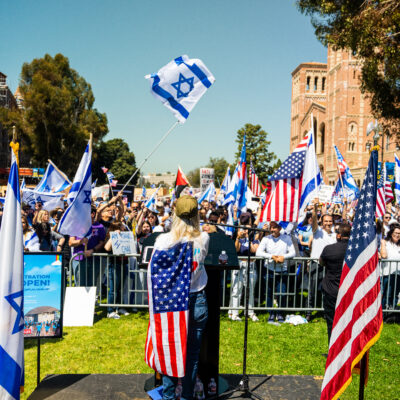Jewish Peoplehood as Practice
 by Matthew Vogel
by Matthew Vogel
Over the past few years, the organized Jewish community has participated in a tremendous amount of research, discussion and implementation surrounding the idea of Jewish Peoplehood as a conceptual framework for engaging with Jewish life and uniting the disparate Jewish communities around the world. Erica Brown and Misha Galperin formulated Jewish Peoplehood as having a “shared history and common destiny” while Yonatan Ariel offered another formulation of questioning more about “who am I, who are you and who are we?” to learn about the commonality of Jews across the world.
Recently, 24 students and six professional staff members from Baruch College, the Inter-Disciplinary Center in Israel, and the Kiev Hillel met in Ukraine to explore Jewish Peoplehood in a program called Kol Hillel. In addition to having seder with the Odessa Hillel and Shabbat with the Kiev Hillel, students also had the opportunity to visit Jewish communities in Zhitomer, Berdichev and Uman. The first seder however, was a particularly special moment for everyone involved. Participants were asked to bring their families traditions to our unified and self-led seder. We sang dayenu and whipped around scallions in the Persian tradition, we ate a Hillel sandwich with everything on the seder plate instead of just charoset and maror as in the Indian tradition and we sang and danced as one people in Hebrew, English and Russian.
On the Baruch blog, one student said, “This has been … interesting in the way that really opens your eyes and teaches you something new.” The trip had four objectives: to build an awareness of the global Jewish community, to connect participants with a global initiative that fosters lasting connections to their Jewish peers, to share best practices about student engagement among students and professional staff and to initiate meaningful conversations about Jewish identity in countries other than ones own.
This project was a natural fit for our collective students from Hillels across the world and was recognized by the Reut Institute last year as being on the cutting-edge of fostering a global Jewish connection for college students. Hillel: The Foundation for Jewish Campus Life has over 500 campus centers across the world that largely operate independently to serve the evolving needs of Jewish students. This initiative was the first to leverage our global network to illuminate Jewish Peoplehood in a tangible and meaningful way. I can say without hesitation that this experience is the pinnacle of my career and we can only keep moving forward. Next year we will bring the cohort to Israel and the following year will see everyone reconnect in New York. We felt it was vital to start this initiative in Ukraine as it showed all the participants that vibrant and deeply engaged Jewish communities do indeed exist throughout the world and not just in the New York / Israel dichotomy that is often highlighted.
When I began my work with Hillel nine years ago in Boulder, Colorado, I wanted to help create a vision of Jewish life that was inclusive, accepting, vibrant and diverse. Continuity seemed like too low of a bar for me; if our community was solely about continuing … then it missed out on the vibrancy of the present and the potential for sustainable connections. Kol Hillel is a model that leverages the international network of our organizations and connections to create a deep and meaningful connection to Jewish Peoplehood. We are grateful for the support of NADAV Foundation, UJA-Federation of New York, Jewish Agency for Israel, Israel Connect (a program of Melitz) and Hillel for believing in this vision and look forward to continuing our collective work with Jewish people around the world.
Matthew Vogel is Executive Director, Hillel at Baruch, Inc.













